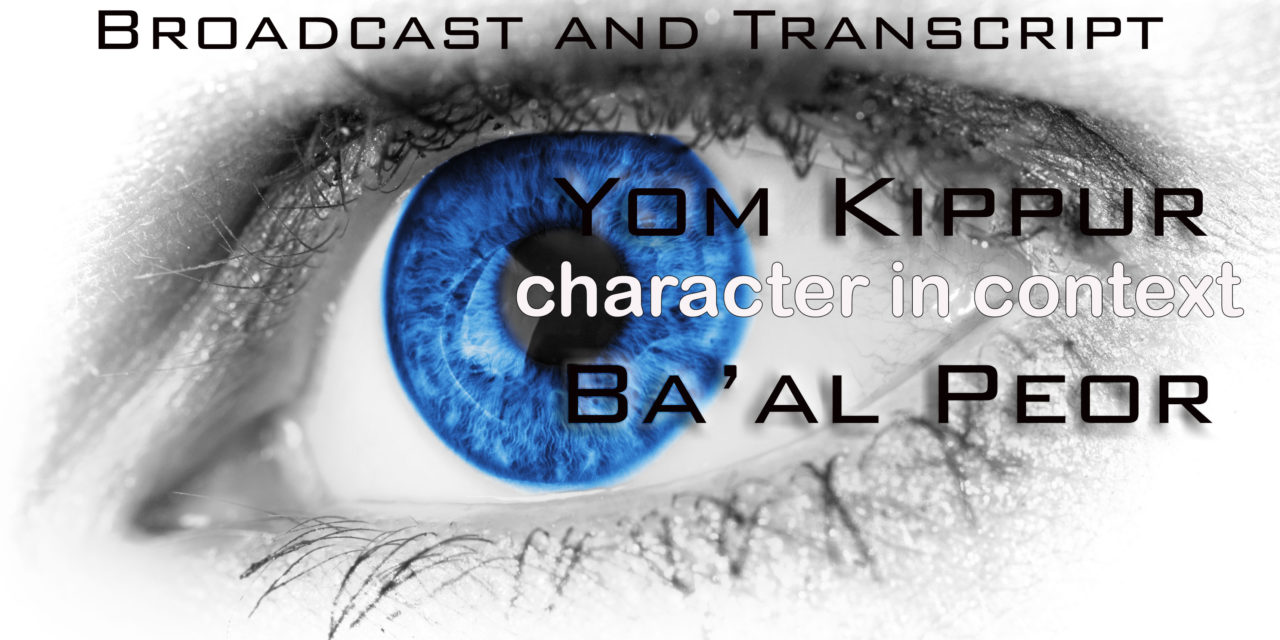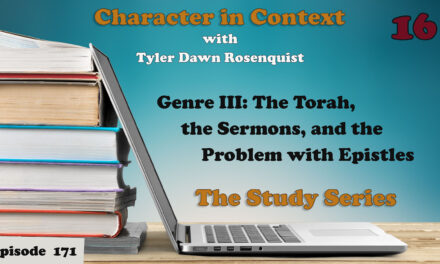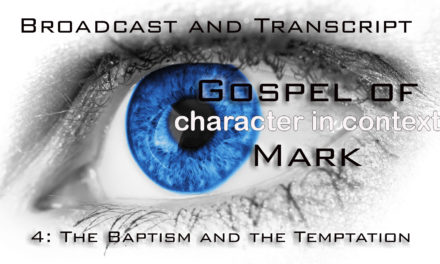Yom Kippur and Ba’al Peor—Character in Context Transcript—October 2019
This is a transcript of a radio broadcast, and so it is not polished like one of my regular blogposts. Please don’t email me or comment about spelling or grammar mistakes unless I accidentally said something nasty. Archives of all past broadcasts can be found and are available for download at the link below:
characterincontext.podbean.com
Yom Kippur is almost upon us and so I want to talk about the sin of Israel with Ba’al Peor among the Midianites. I know, you’re probably like, “what the heck?–and where the heck is she going with this?”
Yom Kippur is the holiest day of the year. The Word says that we are to afflict ourselves, but I see a whole lot of perfectly healthy people online trying to figure out a way to claim they are afflicting themselves while still eating three square meals and taking a day off of work. I dunno. To me, that sounds more like the definition of not afflicting oneself—no work, eating. I don’t see anything even remotely unpleasant about any day off work when I can eat. It’s kinda what I live for. It’s called a vacation. Yes, even if you are praying all day and repenting, you’re still making demands on God by partaking of the daily bread we ask Him to provide. But affliction, mourning—those are times when we forgo life’s pleasures if we are healthy enough to do so. I want to talk about spending one day, one day, without food and water. I also want to talk about the spiritual implications of not even remotely being willing to even go one day without food and water.
And to do that, we are going to delve deeply into the idolatrous fiasco at Ba’al Peor because that was 100% about grasping for pleasures that were not coming from God’s own hand.
I am Tyler Dawn Rosenquist and welcome to Character in Context, where I teach the historical and ancient sociological context of Scripture with an eye to developing the character of Messiah. If you prefer written material, I have five years worth of blog at theancientbridge.com as well as my six books available on amazon—including a four-volume curriculum series dedicated to teaching Scriptural context in a way that even kids can understand it, called Context for Kids—and I have two video channels on youtube with free Bible teachings for both adults and kids. You can find the link for those on my website. Past broadcasts of this program can be found at characterincontext.podbean.com.
First, let’s read the Yom Kippur Scriptures, and then we are going to talk about where the word “afflict” shows up in a parallelism in Scripture, which means I am going to teach briefly about parallelisms—which, if you don’t know what they are, this is going to open up a lot of Scripture for you in your casual readings. And then we are going to talk about Ba’al Peor. Hold on to your hats, and please give me a chance to make my argument and don’t get angry with me. I love you guys, and I am just trying to do battle against a mindset that I have seen lead to some dangerous places.
Before I start I just want to plant a seed related to something that God unexpectedly started teaching me back in July and I have spent the last two months deep in the Word studying it out. Specifically, this—we partake of what God provides, and when He provides it—if God is not providing it, either over or just right now, then we don’t partake of it. In this lies the sin at Ba’al Peor—as well as a lot of other sins and not just food-related. Sometimes God withholds good things for a season or in a circumstance—and I believe that to high-handedly take what He has not given constitutes theft.
29 “And it shall be a statute to you forever that in the seventh month, on the tenth day of the month, you shall afflict yourselves and shall do no work, either the native or the stranger who sojourns among you. 30 For on this day shall atonement be made for you to cleanse you. You shall be clean before the Lord from all your sins. 31 It is a Sabbath of solemn rest to you, and you shall afflict yourselves; it is a statute forever. (Lev 16 ESV)
26 And the Lord spoke to Moses, saying, 27 “Now on the tenth day of this seventh month is the Day of Atonement. It shall be for you a time of holy convocation, and you shall afflict yourselves and present a food offering to the Lord. 28 And you shall not do any work on that very day, for it is a Day of Atonement, to make atonement for you before the Lord your God. 29 For whoever is not afflicted on that very day shall be cut off from his people. 30 And whoever does any work on that very day, that person I will destroy from among his people. 31 You shall not do any work. It is a statute forever throughout your generations in all your dwelling places. 32 It shall be to you a Sabbath of solemn rest, and you shall afflict yourselves. On the ninth day of the month beginning at evening, from evening to evening shall you keep your Sabbath.” (Lev 23, ESV)
7 “On the tenth day of this seventh month you shall have a holy convocation and afflict yourselves.[b] You shall do no work, 8 but you shall offer a burnt offering to the Lord, a pleasing aroma: one bull from the herd, one ram, seven male lambs a year old: see that they are without blemish. 9 And their grain offering shall be of fine flour mixed with oil, three tenths of an ephah for the bull, two tenths for the one ram, 10 a tenth for each of the seven lambs: 11 also one male goat for a sin offering, besides the sin offering of atonement, and the regular burnt offering and its grain offering, and their drink offerings. (Num 29, ESV)
Okay, now this is pretty standard knowledge to those who believe and preach that the Feasts of the Lord are forever—they show us the history of Israel and find their fulfillment (past and future) in Messiah, who has, of course, not fulfilled them all yet so we keep them in anticipation and remembrance of Him. I am not even addressing this to people who believe that the festivals are done away with because that is between them and God—I am talking about people who rail on folks who don’t keep the Feasts and are more than healthy enough to fast for a day and night but try to find ways of getting out of it. You see, to me this is a huge problem with credibility. Don’t yell at people for celebrating Christmas and Easter if your Yom Kippur is simply a day off of work where you eat normally and say a few prayers and try and feel guilty about the sins you really should have repented for a long time before this. So, I am preaching to the choir here—the choir might not like the tune I am playing, but they’ll survive. You guys know how much I care about you and our collective witness.
So, what exactly does afflict mean in Scripture? What’s the word in Hebrew translated as “afflict?”
The word is T’annu, and the lemma, ayin nun heh means a whole bunch of unpleasant things: to be wretched, emaciated, humiliated, oppressed. It is a verb and not a noun, this is an action and not a state of being. Although it is also a day that brings great joy because it marks important transitions in the shemittah and jubilee cycles and a release from slavery, the day itself sees us behaving as servants who are being disciplined. The question is, does a servant under discipline go boldly to his master’s pantry while taking a day off of work and begin eating as if it was a normal day?
So where else does t’annu show up? Glad you asked.
21 Then I proclaimed a fast there, at the river Ahava, that we might humble ourselves before our God, to seek from him a safe journey for ourselves, our children, and all our goods. (Ezra 8:21)
That reference to humbling ourselves is t’annot, the plural version of the verb t’annu—and here Ezra says that he declared a fast so that they would humble/afflict themselves. Clearly, here t’annu is associated with affliction through fasting.
26 The afflicted shall eat and be satisfied; those who seek him shall praise the Lord! May your hearts live forever! (Psalm 22:26)
Here, affliction is contrasted with a future state of eating and being satisfied.
3 ‘Why have we fasted, and you see it not? Why have we humbled ourselves, and you take no knowledge of it?” (Is 58:3)
Again, same root word and here we have the added bonus of what is referred to in ancient writings as a parallelism. In a parallelism, which is very common in ancient wrtings, you get two phrases that say the exact same thing two different ways—equating the two concepts.
Let’s take a really awesome example from Shakespeare’s Richard III where he has a plethora of parallelisms and yes, I know what plethora means. It would be terrible, for example, if I thought I had a plethora of pinatas when, in fact, I did not.
“I’ll give my jewels for a set of beads,
My gorgeous palace for a hermitage,
My gay apparel for an almsman’s gown,
My figured goblets for a dish of wood,
My scepter for a palmer’s walking staff
My subjects for a pair of carved saints
and my large kingdom for a little grave.”
So the theme here is exchanging riches for poverty, and he says it seven different ways one after another. The Bible does this all over the place, but in general the same thing is only said twice. In this case, in Isaiah 58 which details an acceptable Yom Kippur, it says
‘Why have we fasted, and you see it not? Why have we humbled ourselves, and you take no knowledge of it?”
Both lines say the exact same thing—we did X and you didn’t notice. In this case, X is described in two ways—by fasting and humbling themselves, this equates the two concepts. Fasting is equal to humbling oneself which is another translation of the same root behind affliction.
And you know what? You don’t even want to know how many times this lemma shows up in Job to describe suffering that goes WAY beyond mere fasting, which is really only kinda annoying when you aren’t used to it. It isn’t truly what someone who is truly being afflicted would call affliction, but evidently it is considered to be enough by God, thank God.
But some get really eager to get out of this commandment even when they have no legitimate health concerns that would put them in any sort of conceivable danger. I see the same thing with folks who claim that there is yeast in the air and therefore God never meant us to get leavened bread out of our homes during the week of Unleavened Bread following the Passover. I see an inherent danger in being so unwilling to do something that is really very simple—something that can be planned for ahead of time if need be. About a month or two before Passover, I don’t buy anything leavened, I use it up in recipes and only buy one loaf of bread at a time and use it up before buying a new one. That way I am not wasting anything.
But Yom Kippur fasting requires no planning whatsoever. It just requires a willingness to be uncomfortable for 24 hours—the first so many hours are spent with a full tummy and sleeping anyway so the real fast is rather minimal. My kids have been doing it since they were ten without complaint.
But I want to get to Ba’al Peor. So, let’s read the account:
25 While Israel was staying in Shittim, the people began to have immoral sexual relations with women from Moab. 2 Then they invited the people to the sacrifices of their gods, so the people were eating, and bowing down before their gods. 3 When Israel became bound to Baal of Peor, the anger of Adonai grew hot against Israel.
4 Adonai said to Moses, “Seize all the ringleaders and hang them before Adonai facing the sun, so that Adonai’s fierce anger may be turned away from Israel.”
5 So Moses said to the judges of Israel, “Each of you, kill your men who have been joining themselves to Baal of Peor.” 6 Then behold, a man from Bnei-Yisrael came and brought a Midianite woman to his brothers before the eyes of Moses and of the whole assembly of Bnei-Yisrael, while they were weeping at the entrance to the Tent of Meeting!
7 When Phinehas son of Eleazar son of Aaron the kohen saw it, he arose from the midst of the assembly, took a spear in his hand, 8 and went after the man of Israel into the tent and pierced them through—both the Israelite man and the woman’s belly. Then the plague among Bnei-Yisrael was stopped. 9 However, 24,000 were dead because of the plague!
Of course, this took place in the wilderness. After Balaam was not allowed to curse Israel—he came up with a better idea. Hit them where they are vulnerable—food and sex. This way Balaam can “obey” God and just let the Israelites damn themselves. And, might I add, that nothing whatsoever has changed over the last 3500 years? Nothing at all? These are still areas where we are not only able to fall but rush headlong until we do.
“Where are our leeks, and onions, and “free” fish and bread and noms?” and even worse, “All we have to eat is this worthless manna.” Dude, it takes some serious stupidity to say something like that when you’ve been supernaturally fed manna and quail, in a desert, for decades. And us, oh my gosh, if we had leeks and onions and free fish and bread—just think of how WE would be complaining about those menu choices that they considered a luxury. What would people do without coffee, sugar, processed foods, meat every single day and different kinds at every meal if we want it, more cheeses than I can name, restaurants catering to anything we can possibly desire, fruits and veggies, fresh, all year long. I mean, people kick up a fuss about fasting one day a year and I get scared thinking about what it would be like if there was a limited and rationed food supply and they couldn’t even fast for a day. No, seriously, I am serious. It’s scary. What might even a believer do for a cup of coffee or a ho ho or an orange? I tell you, we are so spoiled that we wouldn’t have even made it to the Sea of Reeds before turning back.
But Ba’al Peor, in Hebrew it means the “Master” of Pe’or—the regional god. At this point in the Wilderness journey, almost all of the first generation was dead—this was the second generation. In the very next chapter, the generation who will enter the Land are counted, numbered. So this is a generation of people who has been fed for nearly four decades—not by the sweat of their brow, but by the Hand of God. They haven’t labored for a thing. Everything has been given to them. Their biggest challenge is tending their livestock and moving their tents from time to time and coming up with new recipes for quail and manna. These forty years were meant to be a time of repentance for the nation, where they worshipped and learned to depend solely upon God in preparation for entering a Land flowing with milk and honey where they would again reap the benefit of someone else’s work as they took over vineyards and fields they never planted, drank from cisterns that they never dug, etc…it was almost over. But they wanted more than God was providing for them at that moment—even though they were soon promised abundantly more. I mean, God wasn’t starving them. They had plenty to eat and drink. And they could have sexual relations if they wanted—with their wives! But that’s the deal, they were living during a season of both blessings and restrictions. Oh, I imagine they could eat one of their livestock if they wanted, but we never see any indication that they do—no, they like a free meal on someone else’s tab. They wanted what they smelled over yonder, fresh roasted meat with the blood still in it—strangled meat, cooked up on the altar of a god who wasn’t such a drag, obviously. No dietary restrictions, none of this living in the desert eating the same thing every day, and no silly rules about who you could and could not have sex with and when. Or, at least, it certainly seems that was the attitude of far too many of the men.
God said, “I give you such and such to eat and drink. I will provide it six days a week and double on the seventh but you are not allowed to go out grasping for it on the seventh day and even if you do, it won’t be there. I have also given wives for your sons and husbands for your daughters.”
But the Israelites were always grasping for more—and not just the Israelites. This began in the garden. “You shall not eat of the Tree of the Knowledge of Good and Evil—but they wanted it and one by one they each grasped for what was forbidden and took it. Even though they had been provided with abundance that they never sweated and suffered over.”
Lot received the best of the Land, the Bible says his share was well watered like the Garden in Eden. It was his—but he grasped for city life despite being a shepherd.
God made Esau firstborn, and yet Rebekkah took matters into her own hands by grasping on to a deception against her husband which led to nothing but trouble for her.
Saul grasped tightly to a Kingdom he knew full well no longer belonged to him and it led him into necromancy and attempted murder.
David had the kingship and many wives and sons and daughters, but he grasped for Uriah’s wife who was forbidden to him.
We want what has not been given to us, or given to us right now, or yet.
The Temptation in the wilderness showed us all the way. Be willing to receive what God alone has provided and pay attention to when He is and isn’t providing. Trust during the lean seasons and do not become ungrateful and picky during the seasons of plenty. We must wait for God to give us position and authority and must never grasp those things for ourselves out of season or they will ruin us and everyone around us. We must not long for those things that God has not given us to the point where we go about getting them in wrong ways. It’s such a huge theme in the Bible, this lack of gratitude and patience and trust and needing to have what we want right stinking now. Or else we’re going to go to another god’s camp to get it—Ba’al Peor’s camp, for example. The Midianites offered up the desires of the flesh with no restrictions. Their lives must have looked pretty awesome compared to relatively boring Israelite life spent in the very presence of God—but this younger generation had never known it to be any other way. Perhaps God’s presence was rather passé…you know? Like, “Oh yeah, the cloud and the fire, almost didn’t notice.”
Okay, so don’t get me wrong. I would have personally been suffering smelling the roasted meat of the Midianites and I am not saying otherwise. I don’t know what the meat in question was, but pretty sure it wasn’t quail. They were playing for big stakes so I am thinking fatted calf here. And there is something about foreign women that is always very exotic to men—I mean geez, look at Solomon—he was like the walking, talking one-man example of the entire Ba’al Peor debacle with all his foreign wives and their gods and the temples he built for their gods and we all know why he wanted to make them happy. Nothing has changed in that department.
We eat from God’s provision every single day of the year and most of us have never skipped a meal except by choice. He gives and gives and gives and gives us and if He asks us to afflict ourselves, to fast, for one day out of every year—how small a thing is that to do for Him? I guess the question is, what are we worshiping and obsessing about? Is it God or our next meal? Is our focus on the provision or the provider? The Bible is full of stories about men and women making disastrous choices because they chose to grasp at something that God has denied them. One day a year He denies us food and drink—is that really worth our effort to try and get out of it? Are we really adverse to afflicting ourselves even in such a small and non-threatening way? Sometimes I think of Namaan the leper, and how angry he was when Elijah told him to go bathe in the Jordan if he wanted cured. And, instead of rejoicing and running to do it, he went away furious because he thought the terms of the cure were insulting—he even suggested more appropriate bodies of water. And his servant reasoned with him that if Elijah had asked him to do anything truly difficult, that he would have done it without question. Many are the same about Yom Kippur—we are not being asked to do anything beyond our ability. If God asked us to do something more difficult would we do it? Or is this reticence symbolic of a resentment that God would place any discomforts on us at all?
When I get emails about the keeping of commandments, it’s usually pretty much the same thing—people want their pleasures. They want their “harmless” pornography and want my permission to “dabble” in it, and as a former addict I would never give anyone the okay to do it, married couples who feel they will die if they can’t have sexual relations during the wife’s menstrual cycle (yet who will loudly chastise unmarried people for not being celibate), people who don’t want to give up leavened products during the week of Unleavened Bread, and people who want me to tell them that fasting on Yom Kippur isn’t really necessary for affliction because they really don’t think they can go for a whole day without eating. Each of these involves saying no to our desires, it is a minor sort of affliction, truly. We are not being denied anything we need for life. Let’s just say that God has taken it off the table He so graciously allows us to eat from. But we don’t see the option we want there, even though we are looking at His bounty, and we feel panicked and oppressed. Honestly, for a group that likes to tell people they had better keep the commandments, a lot of us are insanely resentful about keeping certain ones. It’s the stuff you hear in ministry that people would never say in public. In public, you know, we put up a moral façade a lot of the time, and then when no one is looking we are struggling as much as or more than the people we scold. But flesh is everyone’s enemy, and it is commanded that we afflict ourselves on Yom Kippur. We need to be humbled. We need to be denied and put in our place and remember who is and who is not God. We need to feel the weight of our desires and beat our chests and realize that we are not giants of the faith on Yom Kippur but people still subject to the desires of our flesh. But, I am afraid that without fasting, it is generally a rather empty gesture. We lose the effect of coming face to face with our utter weakness before temptation. But, God be praised, we only have to really hold out for about 12 hours, once the full belly and sleep wear off.
If we are not willing to do that, then I imagine we really don’t have a clear concept in mind of what Yeshua endured for us, on an empty belly, for forty days and then for the day of His crucifixion.
Really. It’s one day. We need to be unmasked. We need to face our most basic weaknesses. It is a gift to be able to do so on the day that anticipates so great an atonement.





















